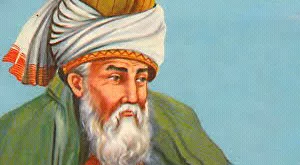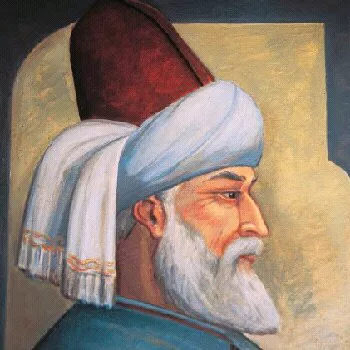RUMI THE PERSIAN POET AUTO BIOGRAPHY
This article's tone or style may not be appropriate for Wikipedia. Specific concerns may be found on the talk page.
Learn more
The English used in this article or section may not be easy for everybody to understand.
Jalal ad-Din Muhammad Rumi (30 September 1207 – 17 December 1273), also named Mawlānā, which means Our Master, is one of the Islamic world's greatest poets. He is usually known in the English-speaking world simply as Rumi. He is a Sufi mystic, philosopher and lover of humanity. His followers began a school of mysticism to encourage and celebrate his teachings—the Sufi branch known to many Westerners as the 'Whirling Dervishes', but whose proper name is the Mevlevi order.
Background and early life
Jalâluddîn Rumi was born in 1207 in Balkh Persia in what is today Afghanistan. His father Bahauddin was a famous religious teacher and mystic who received a position at the university in Balkh.[1] When Mongols invaded Persia, Rumi left Persia for Konya, which was then under the Persian empire. By the time he made it to Konya his mother had died, and he was married with one child, a son.[2]
'Mevlâna' (Our Master) had had his early spiritual education under the tutelage of his father Bahauddin and later under his father’s close friend Sayyid Burhaneddin of Balkh.[3] Mevlâna grew both in knowledge and consciousness of God over the years. Eventually Sayyid...
Learn more
The English used in this article or section may not be easy for everybody to understand.
Jalal ad-Din Muhammad Rumi (30 September 1207 – 17 December 1273), also named Mawlānā, which means Our Master, is one of the Islamic world's greatest poets. He is usually known in the English-speaking world simply as Rumi. He is a Sufi mystic, philosopher and lover of humanity. His followers began a school of mysticism to encourage and celebrate his teachings—the Sufi branch known to many Westerners as the 'Whirling Dervishes', but whose proper name is the Mevlevi order.
Background and early life
Jalâluddîn Rumi was born in 1207 in Balkh Persia in what is today Afghanistan. His father Bahauddin was a famous religious teacher and mystic who received a position at the university in Balkh.[1] When Mongols invaded Persia, Rumi left Persia for Konya, which was then under the Persian empire. By the time he made it to Konya his mother had died, and he was married with one child, a son.[2]
'Mevlâna' (Our Master) had had his early spiritual education under the tutelage of his father Bahauddin and later under his father’s close friend Sayyid Burhaneddin of Balkh.[3] Mevlâna grew both in knowledge and consciousness of God over the years. Eventually Sayyid...




